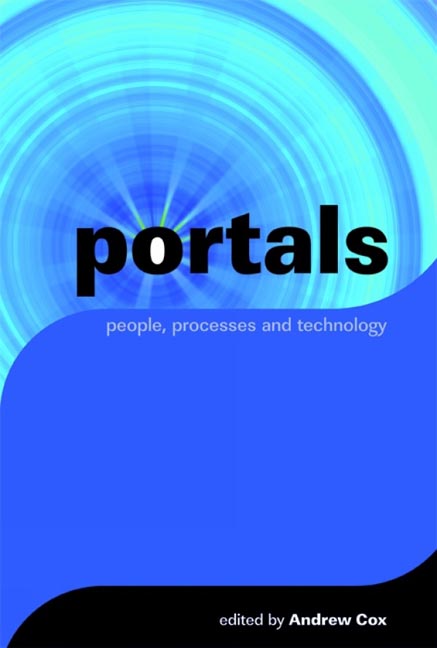Book contents
- Frontmatter
- Contents
- Introductory preface
- Section 1 Core themes
- Section 2 The library and the portal
- 7 Ready to use: consumer, subject and other public portals
- 8 Portals and university libraries
- 9 Library portals
- Section 3 The portal in the corporate sector
- Section 4 Portals in the public sector
- Section 5 The future
- The contributors
- Index
7 - Ready to use: consumer, subject and other public portals
from Section 2 - The library and the portal
Published online by Cambridge University Press: 09 June 2018
- Frontmatter
- Contents
- Introductory preface
- Section 1 Core themes
- Section 2 The library and the portal
- 7 Ready to use: consumer, subject and other public portals
- 8 Portals and university libraries
- 9 Library portals
- Section 3 The portal in the corporate sector
- Section 4 Portals in the public sector
- Section 5 The future
- The contributors
- Index
Summary
Introduction
This volume is concerned primarily with portals that are designed for particular institutions. This chapter differs in considering portals – loosely defined – that are general purpose or subject related and available to all through the open web. Broadly these can be divided into two groups: general consumer portals like Yahoo! and more targeted services – often librarian created – such as the academically related UK Resource Discovery Network (RDN).
There are two reasons for including this chapter in the book: first to help information professionals identify suitable portals for reference work, and second to assist them in prospecting web portals as potential models or sources for local services. Librarians may wish to encourage users to personalize one of these sites as a home page or point them to the best starting points. Librarians will continue to want to incorporate appropriate services in their own portal or website and public services staff might want to develop a MyPage as a home page to support reference and enquiry work, or indeed any staff member might wish to use one as a personal home page. Since public libraries may get enquiries on any topic, portals can be useful starting points because of the range of sources covered, though perhaps most libraries now have their own pages pointing to important content.
The notes on content provided in this chapter are intended to permit the reader to disassemble a portal to identify the features they might want to incorporate locally and to compare particular features, e.g. business news, against other independent sources. The notes on the use of partners should help in seeing which sources are perhaps already familiar, but which might be enhanced in the portal compared with the service's own site.
The portals considered are chosen as important examples of the type and their content is analysed in some detail as it is often not clear from a brief inspection what sort of features there are. Of course, it is inevitable there will be changes by the time you read this.
- Type
- Chapter
- Information
- Portalspeople, processes and technology, pp. 81 - 99Publisher: FacetPrint publication year: 2006



